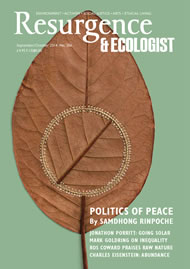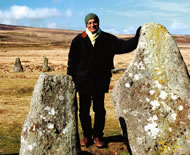Satish Kumar’s title – Soil, Soul, Society – could hardly be more sparse; yet it represents, he says, a “distillation” of his own lifetime’s thinking and that of his heroes – and the three small words are all we really need to put the world to rights. For our aim should be – should it not? – to create harmony in the world; and this must be achieved at three levels. As individuals and as a species we need to move away from our anthropocentricity – for “humans have come to believe that they are separate from Nature and above Nature” – and to see ourselves once more as part of Nature; and this is the notion symbolised by ‘soil’.
For this as for all else, we need harmony within ourselves, practising humility and seeking to abandon ego: the idea encapsulated as ‘soul’. Of course, too, we need to seek harmony with the rest of humanity – ‘society’ – and indeed to treat all creatures with the same compassion.
All this should be second nature, yet it is the diametric opposite of the worldview that came out of the West and now dominates the whole world: entirely anthropocentric; entirely materialistic; crudely ‘rational’ in a calculating kind of way; employing science to control and even ‘conquer’ Nature; and locking us all into no-holds-barred competition, which in essence and commonly in practice has no truck with compassion at all.
Satish’s ideas have been shaped, as all ideas must be, by his own life. He elected as a nine-year-old to become a Jain monk, and there absorbed the essential principles of nonviolence, self-restraint and self-discipline. He became deeply immersed too in the teaching of Buddha and in the great Hindu epic, the Bhagavad Gita – which, said the early-20th-century sage Vinoba Bhave, teaches us that “Nature is divine, sacred, and holy as well as abundant”; indeed, that everything around us “is nothing but divine”.
Then Satish discovered Mahatma Gandhi, who came to play “a very special role in my life”. For Gandhi declared that “to practise spirituality you don’t have to forsake the world and become a monk. The true practice of spirituality … has to be in the world, in everyday life, in politics, in business and in domestic life.” So Satish forsook the monastery, and at age 18 he became an “Earth pilgrim”, of which he has written elsewhere: walking 8,000 miles from India to America spreading the idea of peace – an extended echo of Gandhi’s Salt March of 1930 in protest against imperial domination.
Satish sees Gandhi’s friend and contemporary Rabindranath Tagore as “an Earth activist, a spiritual activist and a social activist”. Tagore believed, like Gandhi, that personal spirituality must be translated into action, and everything he did was “underpinned by a vision to serve the Earth, lift the spirit and transform society”. He was a polymath – a poet and musician who also took over the management of his father’s land and established a rural bank to provide micro-credit to his farm workers. He was also a great educator who liked to teach under a tree because, he told his pupils, “You can learn much more wisdom from the tree than from me.” Tagore collaborated with the English agronomist and philanthropist Leonard Elmhirst to establish the Institute for Rural Reconstruction in West Bengal, called Sriniketan, ‘House of Grace’; and with Dorothy, his wife, Elmhirst went on to establish Dartington Hall in Devon, based on similar ideals. Tagore also had a great interest in science, and among his correspondents were Werner Heisenberg and the deeply spiritual Albert Einstein, who famously commented: “Science without religion is lame, religion without science is blind.” To the greatest scientists, science too is a spiritual pursuit.
The greatest Western influence on Satish was E.F. Schumacher, best known as the author of Small is Beautiful. Like the Eastern teachers, Schumacher knew that mere intellect must be underpinned by spirituality, saying that humanity was too clever to survive without wisdom. Like them, too, he translated spirituality into practical action, for the service of humanity and of the Earth. In Small is Beautiful, he does not argue simply that smallest is always best, but that everything – machines, governments, commercial companies, farms – has an optimum size, beyond which growth is destructive. Alas, his advice has not been heeded, and universal growth has become the universal obsession, with all the resulting distortions and miseries. Satish co-founded Schumacher College in 1990, on the Dartington Hall estate.
Like all his personal gurus, Satish sees the world as essentially benevolent – but it is, he says, “how you see it and what you make of it. If you look at the world with benevolent eyes, the world reciprocates with benevolence. If you project suspicion and self-interest, you get the same in return… If we sow seeds of benevolence, benevolence will grow.”
Thus in this concise, eminently readable, semi-autobiographical form and through the words of his own personal gurus, Satish presents much of the world’s most ancient and most profound wisdom – what Gottfried Leibnitz and then Aldous Huxley called “the perennial philosophy”: that the world is miraculous, ultimately beyond our ken, and certainly cannot be grasped by ‘rational’ thinking alone; the absolute need for compassion to all humanity and to all life; the duty to translate compassion into action. The themes are among the most ancient ever written down, but Soil, Soul, Society is very much of our time.







